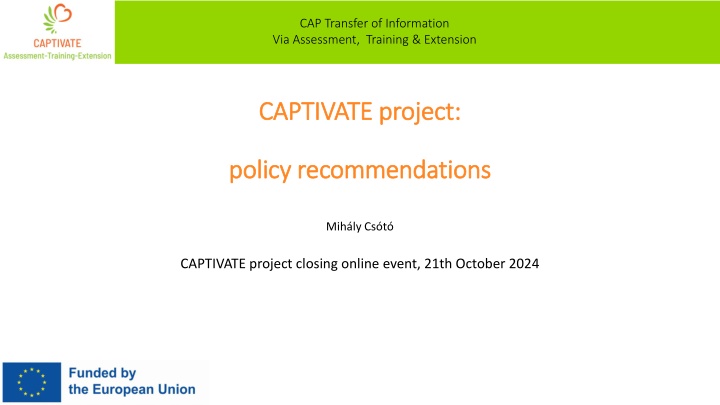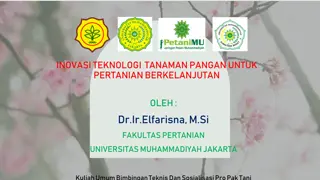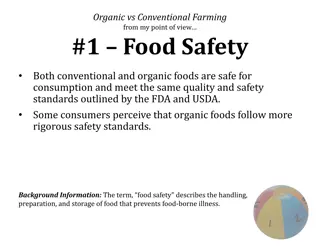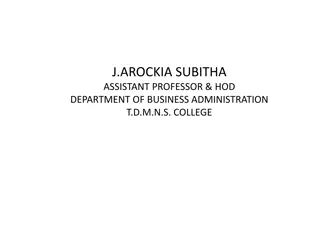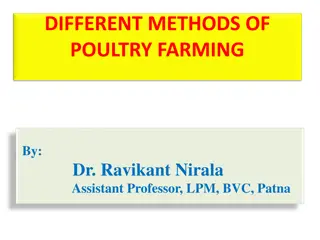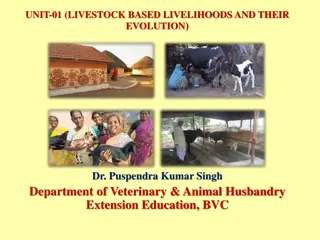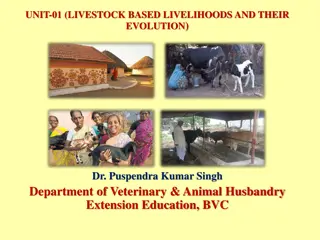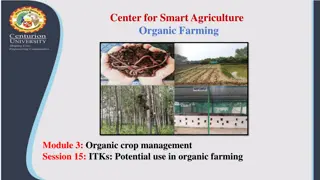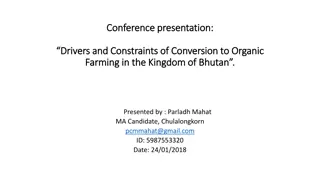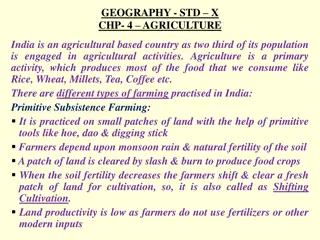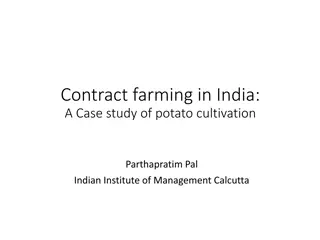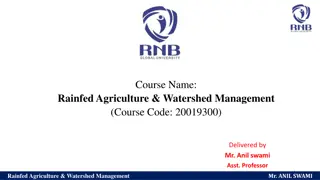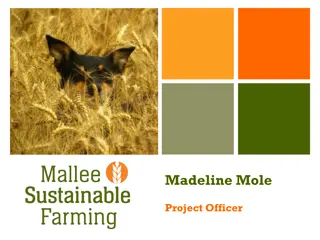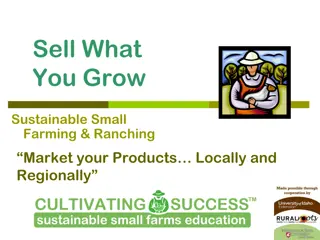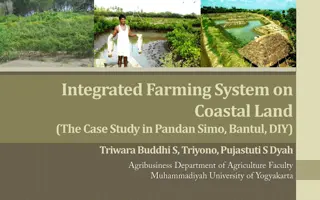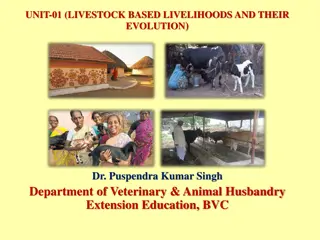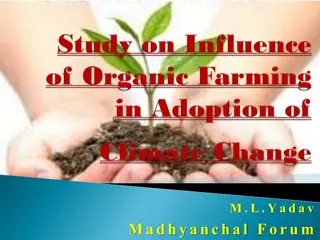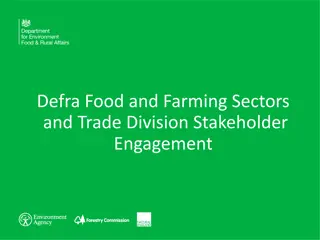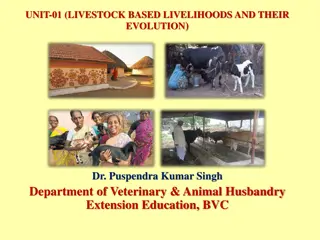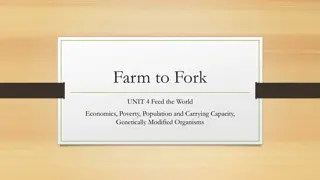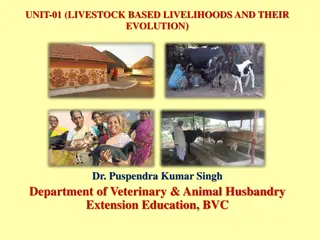Enhancing Sustainable Farming Practices for EU Agriculture
This project addresses the need for enhanced communication and sensitization among farmers regarding new EU green policies. It emphasizes farm assessment approaches, knowledge sharing platforms, and sustainable farming practices to support farmers in adapting to policy changes and implementing eco-friendly techniques. The project aligns with key recommendations from the Strategic Dialogue on the future of EU agriculture, focusing on economic viability, ecosystem services, sustainability assessments, and innovation in agriculture.
Download Presentation

Please find below an Image/Link to download the presentation.
The content on the website is provided AS IS for your information and personal use only. It may not be sold, licensed, or shared on other websites without obtaining consent from the author.If you encounter any issues during the download, it is possible that the publisher has removed the file from their server.
You are allowed to download the files provided on this website for personal or commercial use, subject to the condition that they are used lawfully. All files are the property of their respective owners.
The content on the website is provided AS IS for your information and personal use only. It may not be sold, licensed, or shared on other websites without obtaining consent from the author.
E N D
Presentation Transcript
CAP Transfer of Information Via Assessment, Training & Extension CAPTIVATE project: CAPTIVATE project: policy policy recommendations recommendations Mih ly Cs t CAPTIVATE project closing online event, 21th October 2024
Starting points still relevant Making farmers better understand the background and motivations behind the EU s new green policies, their aims and envisioned implementation steps The recent farmer protests especially brought the attention of policy makers and the wider public to the challenge of more efficient communication and sensitization, finding a balance between sustainability and the viability of farming communities. Highlighting the importance and advantages of developing and conducting a farm assessment approach connected to the new CAP requirements To evaluate the current status of the farm and the impact of interventions after the introduction of new methods becomes increasingly relevant with regards to the monitoring and evaluation of the policies atindividual farm level. The provision of a knowledge sharing platform which allows access to information from both angles of finding financial support and implementing good agro-techniques for more sustainable farming can greatly support their uptake, making the learning and adaptation process quicker, more logical and efficient It has been demonstrated that farms that are aware of the reasons behind what they do and how they accomplish it, and on the other hand are supported by adapted sources of information, advice, and financial resources, have greater opportunities and basic requirements to act sustainably on their own behalf.
Context: The Strategic Dialogue on the future of EU agriculture Many important recommendations from the dialogue are in line with the three basic pillars of the CAPTIVATE project approach: Preparing a Common Agricultural Policy (CAP) fit for purpose Based on farmers economic viability, the CAP should deliver income support for certain active farmers in a much more targeted way. Rewarding and incentivizing farmers to establish and to continue providing ecosystem services, environmental payments should go beyond what is required by EU legislation and aim at the highest ambition in a system to be linked to quantifiable results using robust indicators. Deploying a new approach to deliver on sustainability The Members of the Dialogue call for launching an EU-wide benchmarking system in agriculture and food systems aiming to harmonize methodologies of on-farm sustainability assessments. Enhancing sustainable farming practices Creating pathways for sustainable animal farming in the EU Further action to better preserve and manage farmland, promote water-resilient agriculture, and develop innovative plant breeding approaches Better access to and better use of knowledge and innovation
Lessons learnt Lessons learnt and recommendations In contrast to our preliminary anticipation, the availability of existing resources about good eco-practice descriptions in the local context is limited, especially the ones curated, verified or validated by reliable, professional publishers. This calls for a more systematic approach from the national agencies to support the availability of such resources. There was an unexpectedly high interest for the CAPTIVATE e-learning course in Hungary, connected with the sign-up for the CAPTVATE list of advisors. Learners feedback confirmed the relative lack of this kind of opportunity for self-development and networking at the professional level, which shows the need for developing such programs which have targeted thematic focus for capacity building.
Lessons learnt and recommendations recommendations We recommend to add to those current repository building efforts a new layer where the collected research findings, good practices are also connected to actual CAP themes (or in country level, to measures/submeasures. to support the development of targeted, thematic training programs that translating the complex and interrelating web of agricultural and environmental policies to practical knowledge to concentrate on the direct effects of climate change on the farm level (for different sectors) and to connect them with good practices aimed at that specific problem. to make farm level sustainability assessment a compulsory and/or subsidized part (e.g. in every 3/5 years) of the claiming procedure for CAP subsidies. Another possibility to cement farm level sustainability assessment in everyday practice is to make it a part of the subsidised advisory service programs. to build links with farmers' associations, as a first step in knowledge transfer, as well as for policy implementation and fine-tuning.
